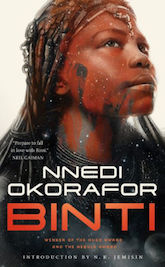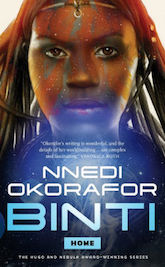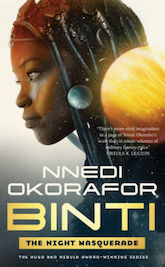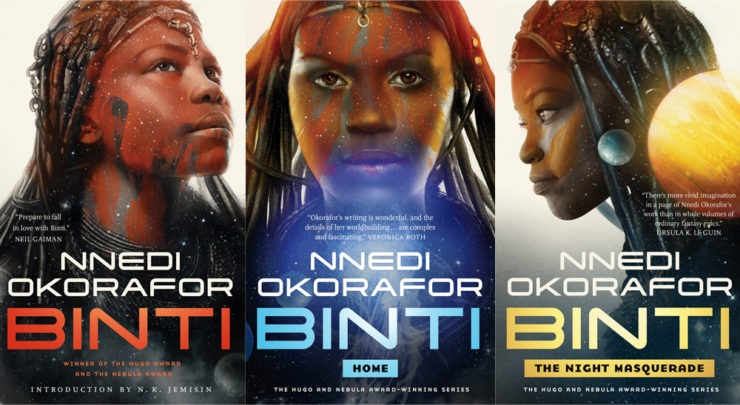One evening, Binti Ekeopara Zuzu Dambu Kaipka of Namib runs away from home. She is a teenager and Himba, a people from southwestern Africa. They believe in staying close to their native land and that women should cover their bodies and hair in otjize, a mixture primarily comprised of “sweet smelling red clay.” Otjize in hand, Binti climbs aboard a living spaceship called the Third Fish as it heads off to Oozma University. Most of the passengers are Khoush, the dominant people in Binti’s country, and they look down on the Himba. But Binti is the first of her kind to be accepted into the prestigious uni and won’t let anything stand in her way. That is, until the Meduse, a jellyfish-like alien species engaged in a centuries-old war with the Khoush, attack the ship. Binti’s people didn’t start this war, but she may be the one to end it.
Buy the Book


Binti
A year after the events of the first novella, Binti, the second, Binti: Home, checks back in on our heroine. She’s still dealing with the trauma of everything that happened aboard the Third Fish, but therapy and her friendship with one of the Meduse, Okwu, has smoothed out the roughest patches. The pair are thriving at Oozma, and Binti is getting used to her okuoko, the tentacles that replaced her hair when the Meduse dosed her with alien genetics. She wants to return home to reconnect with her people, and Okwu joins as an ambassador. The plan is to establish new diplomatic relations between the Meduse and the Khoush, but things fall spectacularly apart.
Binti: The Night Masquerade picks up right after the sequel’s cliffhanger ending. Now full of even more alien biotech, Binti is a force to be reckoned with. The future of her people, the Khoush, and the Meduse rests in her hands, but is she ready for the responsibility? All the angry men in charge certainly don’t think so. Her home destroyed, her family gone, her village turned against her, the Khoush and the Meduse too busy screaming at each other to hear reason, everything seems lost. Binti must risk everything to save her homeland.
I have a confession to make. I don’t actually like hard science fiction. Or, more accurately, I don’t like how hard SF is generally presented. Space wars, cyberpunk, and alien invasions don’t move me one way or the other, but when authors slather dense layers of technobabble over everything I lose interest. What really kills it for me, though, is how homogenous the genre tends to be. Future humans are either cut from the same bland Star Trek cloth or play-acting poorly drawn metaphors for racism but without any real understanding of systemic oppression or colonialism. Main characters are almost always white, cishet, and able-bodied, and very often male. On the unusual occasion where a marginalized person gets to be in charge they either live in a utopian society where the -isms don’t exist or where human culture is homogenized into an American/European-centric interpretation of “progress.” *yawn*
Buy the Book


Binti: Home
I want SF that doesn’t just have queer, disabled, POC characters in the margins but as leads. Take every SF trope and run them through the perspectives and heritage of literally anyone else in the world but more straight white people. Give me stories of Haitian space opera, Diné cyberpunk, Iñupiat building robots, Quechua space exploration, Maasai virtual reality, Māori military SF, Laotian bioengineering. Feature a cast that’s queer, disabled, neurodiverse, fat, intersectional, everything. Give me versions of science fiction I’ve never seen before and let other voices, cultures, and beliefs take center stage. And for the love of Hera, let those stories be told by authors with those personal experiences.
This is a very roundabout way of saying how much I appreciate Nnedi Okorafor’s work. Binti the series and Binti the character both challenge the dominant narrative of who gets to be a hero in science fiction, what the future might become, and what victory looks like. In fiction and in her own world, Binti shatters stereotypes and tradition. She will not be what others have tried to make her, and neither will Okorafor’s series.
The only element of the series I didn’t love was how little of the world we saw. To be fair, Okorafor has plot-related reasons for most of the missing pieces. Binti’s hyperfocus on her people is thematically sound—her people never leave their homeland, much less the earth, and the same accusation of myopia could be thrown at most other SF. If the series was written by a white author, “Becky” would’ve been from some small Midwestern town and never even considered what’s going on in southwest Africa.
The Meduse-Khoush war didn’t get enough play either. For the ants getting trampled in the grass (i.e.: the Himba) as the elephants fight, why the Meduse and Khoush are at war matters a helluva lot less than how to get them to stop. But for me as a reader, I needed to know more about the war to feel something other than pity for the Himba. Because we see so little of the Meduse, Enyi Zinariya, Khoush, and the Himba (other than Binti, who is more defined by how she pushes against Himba tradition), it’s hard to get worked up about what’s happening to anyone not Binti. Even Okwu gets very little shading.
Buy the Book


Binti: The Night Masquerade
Ultimately, Binti feels like novels crammed into novellas. Or maybe I just want to spend more time in Binti’s world. I honestly don’t know. But—and this is a very big “but”—you absolutely should not let that dissuade you from picking up the series. My quibbles are just that: quibbles, and personal ones at that. Although I felt like I was experiencing Binti’s world with blinders on, that didn’t diminish the enjoyment I got out of the glimpses Okorafor offered. Is it really such a bad thing to like spending time with an author’s creation so much that it’s disappointing to not have more? Lucky for me, each novella is longer than the last, so my whinging is diminishing.
Okorafor expertly wields science fiction as a means of exploring the myriad complexities of cultural identity. What does it mean to be oppressed? What does it mean to be an oppressor? What does it mean to be both, or to be neither but trapped between each side? Are we who we say we are because of our traditions or because of how we choose to identify?
Binti is full of heart and emotion. It’s not a perfect series, but it’s a strong one. Sometimes the drama can get too heated, the action too frenetic, and the conceptual ideas too vague—I still don’t understand “treeing”—but it’s got a killer hook. Okorafor knows her genre and isn’t afraid to show off. There’s a reason this series (and her other works) are practically drowning in accolades and awards. I guarantee if there’s a fourth novella, I’ll be at my local bookstore the day it’s released.
New hardcover editions of Binti, Binti: Home, and Binti: The Night Masquerade are available from Tor.com Publishing.
This article was originally published in January 2018
Alex Brown is a YA librarian by day, local historian by night, pop culture critic/reviewer by passion, and QWoC all the time. Keep up with her every move on Twitter, check out her endless barrage of cute rat pics on Instagram, or get lost in the rabbit warren of ships and fandoms on Tumblr.










